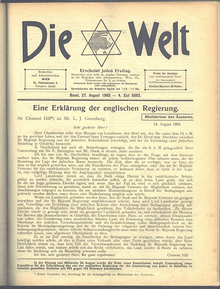Uganda Scheme
The Uganda Scheme was a proposal presented at the Sixth Zionist Congress in Basel in 1903 by Zionism founder Theodor Herzl to create a Jewish homeland in a portion of British-controlled East Africa. He presented it as a temporary refuge for Jews to escape rising antisemitism in Europe. At the congress the proposal met stiff resistance.[1][2]

History
British Colonial Secretary Joseph Chamberlain was aware of the ambitions of the Zionist Organization, which had been on his mind during a trip to East Africa earlier in the year. Chamberlain noted during his trip that, "If Dr Herzl were at all inclined to transfer his efforts to East Africa there would be no difficulty in finding land suitable for Jewish settlers."[3]
Herzl was introduced to Chamberlain by Israel Zangwill in the spring of 1903, a few weeks after the outbreak of the Kishinev pogroms.[4]
Chamberlain offered 13,000 square kilometres (5,000 sq mi) at Uasin Gishu (also spelled "Gwas Ngishu"), an isolated area atop the Mau Escarpment in modern Kenya (not Uganda).[5]
The land was thought suitable because of its temperate hill station-like climate and its relative isolation, being surrounded by the Mau Forest. The offer was a response to pogroms against the Jews in Russia, and it was hoped the area could be a refuge from persecution for the Jewish people.[6]
Chamberlain saw the land as he was passing by on the Uganda Railway, although the land was not in fact in Uganda but in the East Africa Protectorate (modern Kenya).[7]
This territory had only recently been transferred from the Uganda Protectorate to the East Africa Protectorate in 1902, as part of the Uganda Railway development plan.[8]
Herzl presented the plan at the Sixth Zionist Congress but it faced resistance from many of the 573 assembled delgates. They considered it a betrayal of the 1897 Basel Program which had promoted settlement in Palestine. The plan won the formal support of the congress but it caused a rift between those who were in favor of the plan and those who were against it. Especially the Russian delegates were unhappy with the plan. "These people have a rope around their necks, but they still refuse," Herzl commented.[1]
Shortly afterwards, the British withdrew their offer of land in East Africa.[1]
In fiction
- The story of the 1904 expedition, as well as an imagined vision of a Jewish state in Uasin Gishu, is told in Lavie Tidhar's novelette "Uganda", in his 2007 collection HebrewPunk.[9]
- Adam Rovner's "What If the Jewish State Had Been Established in East Africa", a travel guide for the fictional Jewish homeland of New Judea, located in present-day Uganda, won the 2016 Sidewise Award for Alternate History award for short form alternate history.[10] According to Adam Rovner the plan was attractive to early Zionists as it "twinned the adventures of [Henry Morton] Stanley with the adventurism of the Age of Empire, stagecraft with statecraft."[11]
See also
- Abayudaya
- Madagascar Plan
- Jewish Autonomous Oblast
- Slattery Report
- Fugu Plan
- Beta Israel
- Lemba people
- Proposals for a Jewish state
- Jewish Territorialist Organization
References
- Ervin Birnbaum (1990). In the Shadow of the Struggle. Gefen Publishing House Ltd. pp. 40–. ISBN 978-965-229-037-3.
- Thomas G. Mitchell (13 May 2013). Israel/Palestine and the Politics of a Two-State Solution. McFarland. pp. 152–. ISBN 978-0-7864-7597-1.
- Rovner 2014, p. 52a: "Chamberlain had been acquainted with Zionism’s aspirations for territorial colonization prior to his departure and Herzl had been on his mind while in Africa... Chamberlain mused in an official report composed during his travels in the continent, “If Dr Herzl were at all inclined to transfer his efforts to East Africa there would be no difficulty in finding land suitable for Jewish settlers.”"
- Rovner 2014, p. 51: "Thanks in part to Zangwill's efforts, Herzl found himself admitted to the drawing rooms of philanthropic and political power. Most important to the Zionist leader was his introduction to 'the great Joe,' Colonial Secretary Joseph Chamberlain. Chamberlain an influential cabinet member and the most forceful imperialist of his day was sympathetic to Jewish suffering though not above making a cutting remark about Jews when it proved politically expedient. In the spring of 1903 the fastidiously dressed sixty-six-year-old secretary was fresh from a trip to British possessions in Africa.... Whatever the genesis of the idea, Chamberlain received Herzl in his office just weeks after the Kishinev pogroms. He fixed Herzl in his monocle and offered his help. 'I have seen a land for you on my travels,' Chamberlain told him, 'and that’s Uganda. It's not on the coast, but farther inland the climate becomes excellent even for Europeans ... [a]nd I thought to myself that would be a land for Dr. Herzl.'"
- Joseph Telushkin (1991). Jewish literacy. HarperCollins. ISBN 0-688-08506-7.
Britain stepped into the picture, offering Herzl land in the largely undeveloped area of Uganda (today, it would be considered an area of Kenya). ...
- Theodor Herzl's biography at Jewish Virtual Library
- Rovner 2014, p. 52b:"The land Chamberlain had actually seen on his travels belonged to the East Africa Protectorate and not the separately administered Uganda Protectorate which had no coastline. But he had watched this prospective territory pass by while chugging along the Uganda Railway which stretched from Mombasa to Lake Victoria. The confusion between the name of the railway and the actual region proposed for Jewish colonization meant that the scheme would thereafter be known as the Uganda Plan.""
- Červenka, Zdenek (1973). Land-locked Countries of Africa. Nordic Africa Institute. pp. 81–88.
- The story online at Flurb Magazine http://www.flurb.net/5/5tidhar.htm
- "Best Short form tie: Adam Rovner, What If the Jewish State..." Sidewise Awards. Twitter. August 20, 2017. Retrieved April 26, 2018.
- Rovner 2014, p. 45.
Bibliography
- Rovner, Adam (2014). In the Shadow of Zion: Promised Lands Before Israel. NYU Press. ISBN 978-1-4798-1748-1.CS1 maint: ref=harv (link)